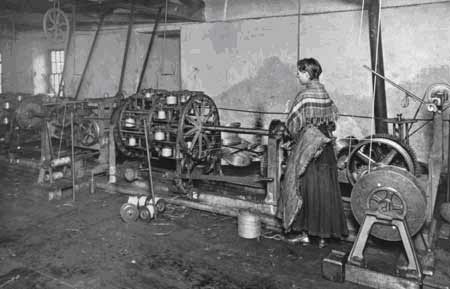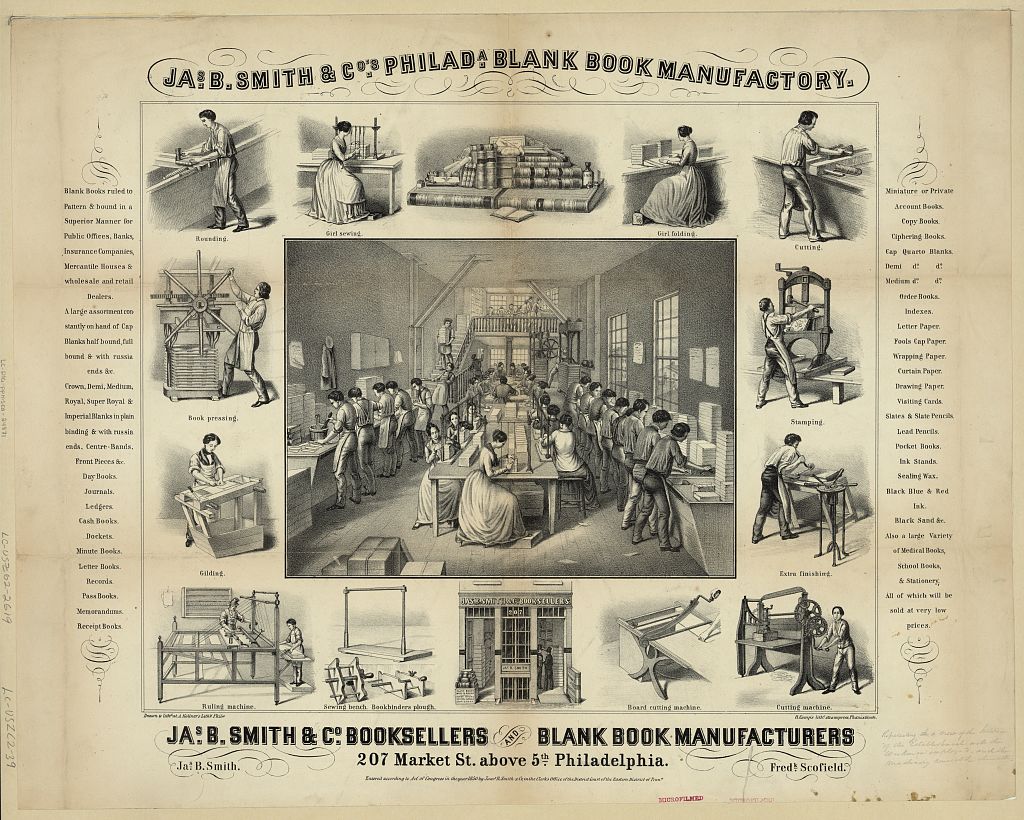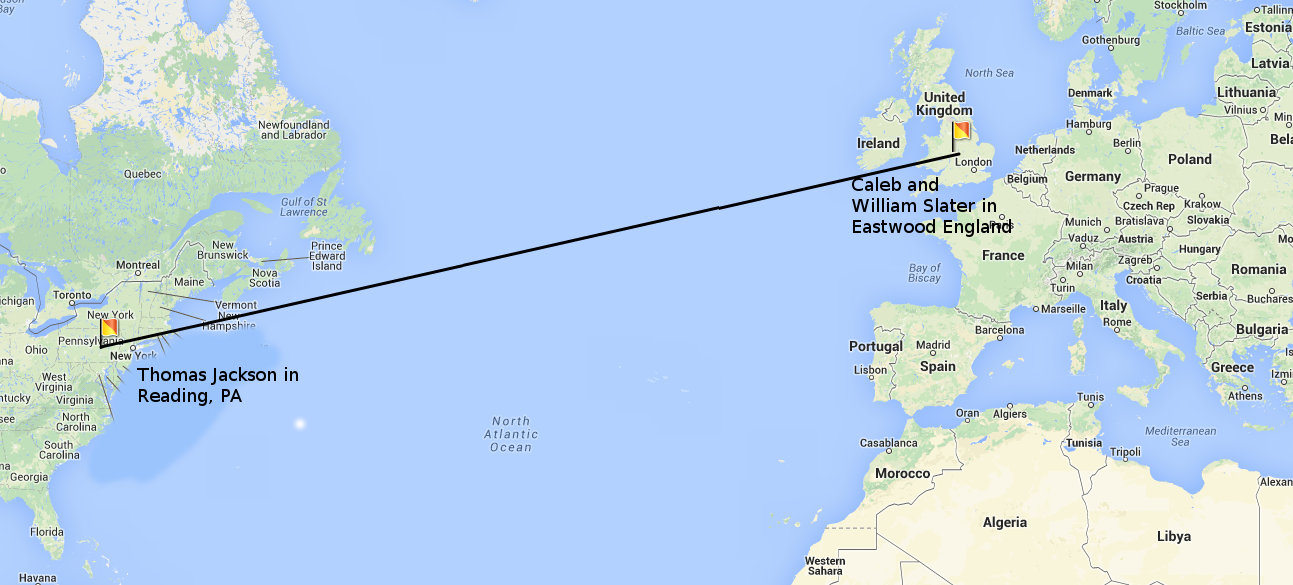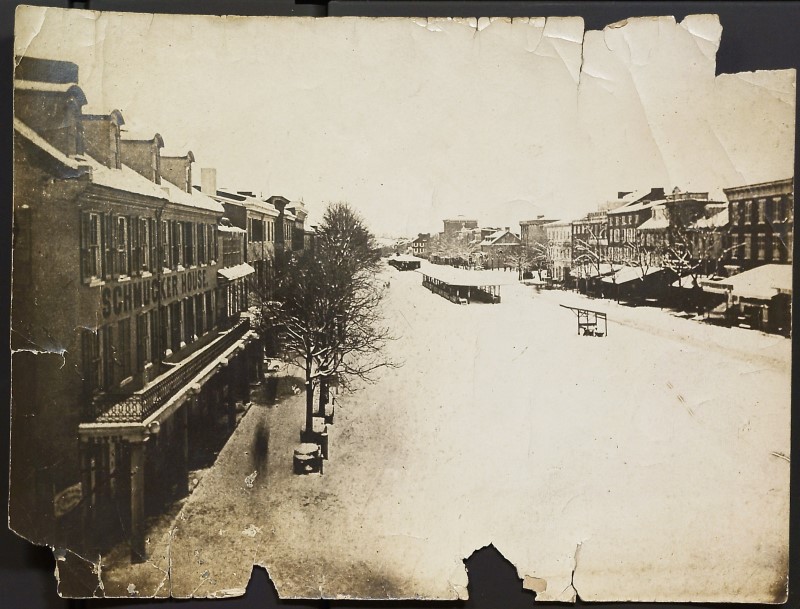
Passionate Abolitionist and
Witness to the American Civil War


Passionate Abolitionist and
Witness to the American Civil War

Thomas Jackson covers family news and then reveals that his English Cousin, Caleb Slater has sent his son, William, to work at Thomas Jackson’s rope walk in Reading. TJ seems very impressed with William and holds him up as a good example of an Englishman. Makes bigoted comments about many of the other nationalities who make up America, most particularly the Irish!
TJ suggests that William should think about marrying (“Hang up his hat” with) the woman who runs the boarding house where he stays. (A “very nice old maid, who has an income 3 or 400 pounds English year and she gives the board, washing and mending for 12 shillings a week, just to have a man in the house at night.” . . . but William “don’t seem to fancy it. Thinks her too old, although she’s only somewhat over 40 and a very nice, pious and good woman.”
Also family references to Aunt Watson who lives near TJ and her sister (Aunt Reilly) who still live in England and their wishes late in life to die close to each other.

Around 1800, another English rope maker, Richard Fothergill, revolutionized rope making worldwide.
He invented a steam powered process that could out-produce all the earlier competition. But was costly to built so that Thomas Jackson and his brother, on arriving in America, started out with less efficient processes and only later moved in to “Steam Cordage”..
Sunderland City Council, Heritage Gallery

A book manufactory in Philadelphia, PA
In the early days, many factories relied on simple machines and human muscle power. The same was true of Thomas Jackson’s early days of rope making. Later, however, the arrival of steam powered machines made it possible to produce many more ropes of bigger dimensions.

Thomas Jackson’s and William Slater’s long trip to Reading
Starting out in the small colliery towns near the middle of England, they joined many Europeans seeking a new life In America

The City of Reading. PA
Thomas Jackson’s and William Slater’s new home town must have seemed very large and progressive compared to the small rural towns they left in England. This rare photo of around 1865 shows the wide Penn Street with market stalls. Although impressively wide, the roads were not yet paved.
4) JAN 10, 1859 Transcript Letter of 4 pages
Reading Jan’y 10 1859
Dear Cousin Caleb,
After a long silence I again sit down to write to you. I suppose your son William has given you all our family news so that there is but little that I can say that will be news to you. However I was at John Watsons in April last and had the pleasure of spending one whole Sunday with our dear good old aunt. She was and still is, the same thoughtful, kind hearted & anxiously affectionate aunt that she always was, ever since I knew her first at Kirkby Woodhouse full five and forty years ago. She is still a wonderfully active woman for her age & old as she is, has still a fine beautiful head of hair, with scarce a gray one in it. I intend to make a journey on purpose to see her again, & again as often as I can, although it is over 100 miles from here. When I saw her last it was a few weeks after John Watson’s wife died and Aunt was then and is now, taking all the care of his household upon herself. She talked much of her sister Riley and so wished that they could be together and die together. A very solomn but a very, very, beautiful idea. For two sisters to pass their girlhood together and then, after sixty, over sixty years
page 2
of seperation, and going through all the trials and varied scenes of life that they have, to come together again and make their home under the same roof, there to comfort and cheer each other, and renew afresh all those fond and affectionate endearments that their hearts and feelings delight in, would indeed be a very great gratification to them. Really if I were to come to England this summer I should feel very much like bringing Aunt Riley back with me, if she could bear the voyage, only to be repaid by the great satisfaction of seeing these two good old souls together once again. But I fear it cannot be. Whether I shall ever see my dear dear native land again or not, is, I think very very uncertain. It seems as if something was always to happen to hinder me. But it is of no use to repine. The never ceasing round of toil & care cannot be avoided & the battle of life must be fought as long as this life lasts. Of all this you are as fully aware as myself.
Still there is a great satisfaction in knowing and feeling that we have done, & are still doing our best, as far as we know & can, for all those who are so dear to us. Both my sons are men grown now. The youngest is 19 and both are steady, sober and industrious. Him and your son William are a good deal together and I am glad
page 3
of it. William is a very nice and worthy young man and very much thought of & respected here. I am glad he came over for I am proud of such a good sample of an Englishman to introduce to my American friends here. For I do assure you that the old world sends a great many very hard cases over here. English, Scotch, Welsh, Irish, Dutch, German, French, Spanish, Portugese, Italians Danes, Swedes, Russians Reurpeans and all the rest of them even to the Chinese and Malays & all come here and mix up & settle down into this great American democracy. But of all that come here, the Irish are the worst specimens of human species that America receives and the English and Scotch are the best. So you see I am proud of your son and he seems to be getting along very comfortably. True we are making only 3/4 time now, but that brings him about 19 shillings English a week, and he is boarding in a very nice genteel house across the street from where I board, along with a very nice old maid, who has an income of 3 or 400 pound English a year and she gives him board, washing and mending for 12 shillings a week, just to have a man in the house at night. I want Will, to hang up his hat there, and I gess he could easy too, but he don’t seem to fancy it. Thinks her too old. although she’s only some what over 40 and a
page 4
very nice, pious and good woman, and most excellent housekeeper. Lives in her own house & keeps it like a little palace. Every thing so nice. Were I a marrying man, Will would lose the chance soon. But I expect he has done as I did. Left his ladylove in England and cant forget her. Well well if it fit in England. Well well, if it be so, tell her from me that Will is very true to her and well worthy of her, be she whomsoever she may. Now as to dear aunt Riley. John Watson and me have put a pound apiece together for her & inclosed is a draft for £2. All we can send just now. But we are trying to get £2 more from William and Amos Watson. They are both better off than we are & can well aford it. And I think will give it. So she may expect £2 more soon. Both my surviving brothers have been unfortunate & are poor & I fear I shall get nothing from them for her. However Watsons are all able to help her and I will see that she is not forgotten. Please give my love to her and remember me most kindly to her. We may both live to meet again although she is so old. I am getting old myself, fast. And if we ever meet again you will see the great change that time has made in me. I have not told William of this letter so you need not tell him of its contents. Please write to me & let me know of your receiving this letter safe.
And now Dear Cousin, with most sincere love to you & all your amiable family, allow me ever to remain your affectionate cousin
T Jackson

Ambassadors' Notes are commentaries added by the original founders of the Thomas Jackson letters and are intended to add context to the transcription that proceeds them. Other comments by visitors may have been offered in Recent Research and Commentaries in the seventh panel of the homepage.
Thomas Jackson’s Character and State of Mind
This letter adds greatly to our understanding of Thomas Jackson’s family and circumstances. At this time in his life, he seems pragmatic and lonely. “The never ceasing round of toil & care cannot be avoided & the battle of life must be fought as long as this life lasts.” Adding to his business disasters caused by flooding, his wife had died back in 1843 while she was visiting her relatives back in England. He does not even live a house of his own but instead, he boards out near to his rope manufactory.
This letter also reveals that William Slater, the son of Thomas Jackson’s English cousin Caleb Slater, is now staying in Reading. PA and working at Jackson’s rope works. He writes enthusiastically about how he considers William Slater to be a great example of an Englishman.
This may be a good time to comment on an impression that readers may gain about the unimpeachable, high-minded character of Thomas Jackson as a result of how strongly he spoke out against slavery from this early days in America. Because of this, it is easy to view him as a sort of moral and ethical icon of a human being. However, a thorough reading of this collection of letters shows us that, in reality, Thomas Jackson reveals a flawed, human side to his character, just like all the rest of us. Here for example he bluntly announces that the English (and “Scotch”) are superior to all the other races that arrive and merge to make up American society. He dismisses all the other nationalities but particularly the Irish who he writes off as “the worst specimens of humanity that America receives.”
Amusingly, we see that TJ was not above trying to encourage William Slater to “hang up his hat” with the woman whose boarding house he was staying in. TJ confesses that if he “were a marrying man, Will would loose his chance soon!” Thomas Jackson comes over as an individual with very human foibles. But to his credit, he did stand firmly against slavery from his earliest days in America.
Unfamiliar names
repine:
1.to feel or express dejection or discontent : complain
2. to long for something
To yearn after something: e.g. Immigrants who repined for their homeland ((Merriam Webster online)).
Kirkby Woodhouse was a mining area about 10 miles from Ilkeston and Eastwood (where Caleb Slater was based) on the Nottingham / Derby border

A book manufactory in Philadelphia, PA
In the early days, many factories relied on simple machines and human muscle power. The same was true of Thomas Jackson’s early days of rope making. Later, however, the arrival of steam powered machines made it possible to produce many more ropes of bigger dimensions.

Thomas Jackson’s and William Slater’s long trip to Reading
Starting out in the small colliery towns near the middle of England, they joined many Europeans seeking a new life In America

The City of Reading. PA
Thomas Jackson’s and William Slater’s new home town must have seemed very large and progressive compared to the small rural towns they left in England. This rare photo of around 1865 shows the wide Penn Street with market stalls. Although impressively wide, the roads were not yet paved.